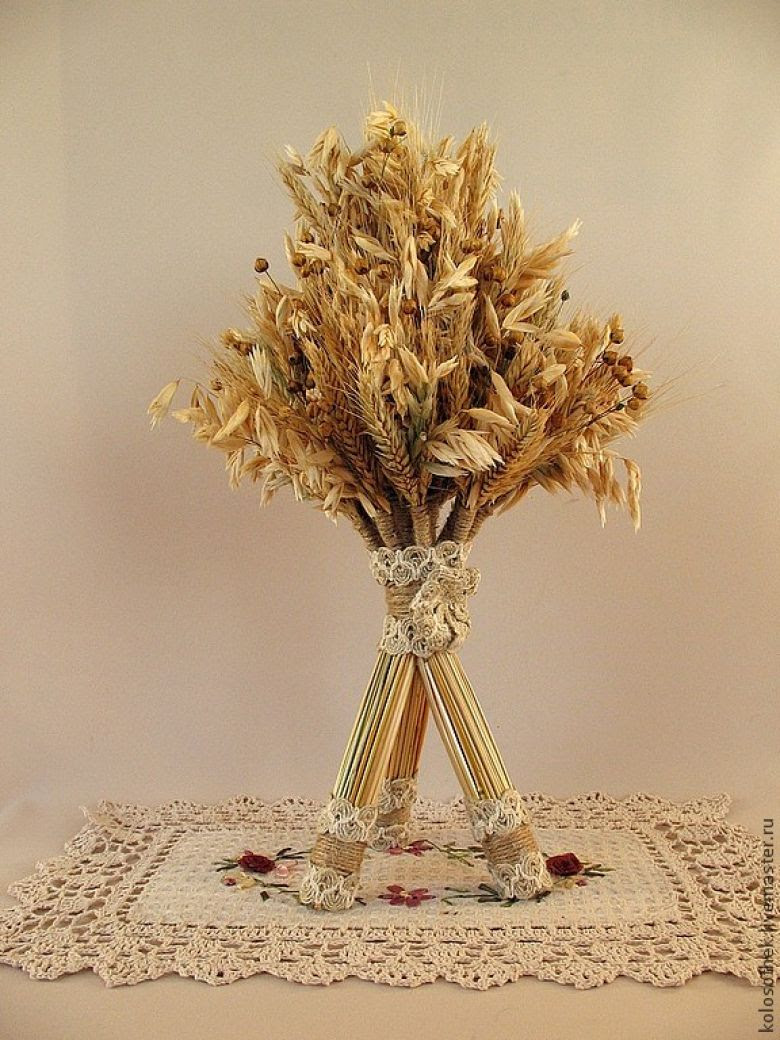In Ukraine, instead of or in combination with, the Nativity of Christ, they try to plant the pagan cult of "Didukh"
Автор: Митрополит Агафангел. Author:
Metropolitan Agafangel Дата
публикации: Date of publication:
05 января 2018 January 05, 2018
. .
Категория:
Авторская колонка . Category:
Author's column .
 Пока это делается не вместо, а вместе с Рождеством Христовым.
Пока это делается не вместо, а вместе с Рождеством Христовым.
While this is
done not in place of, but in conjunction with the Nativity of Christ.
Всего
несколько лет назад на Украине вспомнили о существовавшем раньше языческом культе так называемого "дидуха".
Just a
few years ago in Ukraine, they remembered about the pagan cult of the
so-called "didukh" that existed before Christianity.
Дидух – это сноп, в который, по бытовавшим когда-то языческим суевериям, вселяются души умерших
предков.
Diduh is a sheaf-bundle into which, according to the once pagan superstitions, the souls of the dead ancestors settle.
Перед этим снопом ставилась еда "для покойников" и проводились иные языческие обряды.
Before this sheaf-bundle was put food "for the dead" and held other pagan rituals.
В
итоге, с наступлением весны этот сноп сжигали, и души предков, якобы, возвращались туда, откуда пришли.
As a
result, with the onset of spring, this sheaf-bundle was burned, and the
souls of their ancestors supposedly returned to where they came from.
В
наши дни предлагается вернуться к этому языческому ритуалу и встречать
Рождество Христово вместе с душами предков, вселившимися в "дидуха".
Nowadays,
it is suggested that there be a return to this pagan ritual and to meet
the Nativity of Christ together with the souls of the ancestors who
settled in the
"Didukh".
Ввиду явного языческого содержания этого культа, необходимо нашим священнослужителям и прихожанам
не поддерживать эту насаждаемую нашему народу глупость.
In
view of the
explicit pagan content of this cult, it is necessary for our priests and
parishioners not to support this stupidity that is planted to our
people.
Не
освящать и не помещать на почетном месте в доме подобные снопы, а тем более, не относиться к ним как культовым объектам.
Do not bless or place in a house or in a place of honor, such sheaves, let alone treat them as cult objects.
Рождество Христово – это Боговоплощение, величайшее в истории всего человечества событие,
и грех к нему примешивать подобный языческий вздор.
The
Nativity of Christ is The Incarnation, the greatest event in the history
of all mankind, and it is a sin to mix it with pagan rubbish.
+ Митрополит Агафангел
+ Metropolitan Agafangel
Для примера приведём статью из интернета.
For an example, here is an article from the Internet.
Дидух – древнеславянский родовой новогодний символ
Didukh
- Ancient Slavic New Year's Symbol

Дидух
— древнейший
славянский, дулибский, роський, украинский, новогодний, рождественский
символ, знак бессмертия предков, оберега рода, благополучия, достатка,
хорошего урожая.
Didukh - the oldest Slavic, Dulibian, Russian, Ukrainian, New Year, Christmas symbol, a sign
of the immortality of ancestors, the guardian of the family, prosperity, health, and a good harvest.
Он - славянский
дедовский Дух, Дух предков рода, знак присутствия предков на новогодних празднецтвах (при рождении нового кола).
The
Didukh is the Slavic Grandfather-Spirit, the Spirit of the ancestors
of the family, the sign of the presence of those ancestors on New Year's
festivals
(at the birth of a new year).
Для всех славян
первый и последний сноп урожая имел и имеет особое значение.
For all Slavs, the first and last sheaf of the harvest was and still is of special significance.
Дидухом
называют
все то, что хозяин и его старший сын первыми приносят на Сочельник в дом
— ржаной, пшеничный или овсяный сноп, который ставится хозяином в
красный угол, вокруг него старшим сыном или хозяином на пол и на стол
под скатерть стелется солома и сено.
Diduh
is labeled as, everything that the owner and his eldest son bring to
the house on Christmas
Eve - a rye, wheat or oat sheaf, which is put by the owner in
the beautiful [icon] corner, around it, are gathered the eldest son or
master, and on the floor and on the table under the tablecloth, are
straw and hay.
Дидухи
в традиционной
фолькльорной палитре рождественско цикла праздников могут различаться по
местным колоритом, иметь свои типологические черты, что обусловлено
влиянием местной и христианской традиции, смещением в календаре, потерей
внутренней формы обычаев и обрядов, изменениями
в традиционном образе жизни.
Didukhs
in the traditional folkloric palette of the Nativity cycle of holidays,
can differ
in local color, and have their own typological features, which is due to
the influence of local and Christian traditions, a shift in the
calendar, the loss of the internal form of customs and rituals, or
changes in the traditional way of life.
http://ruspravda.info/Diduh--drevneslavyanskiy-rodovoy-novogodniy-simvol-2973.html
http://ruspravda.info/Diduh--drevneslavyanskiy-rodovoy-novogodniy-simvol-2973.html
Печать
Printing
E-mail
E-mail address
No comments:
Post a Comment
Guest comments MAYBE can be made by email.
joannahigginbotham@runbox.com
Anonymous comments will not be published. Daniel will not see unpublished comments. If you have a message for him, you need to contact him directly.
oregdan@hotmail.com